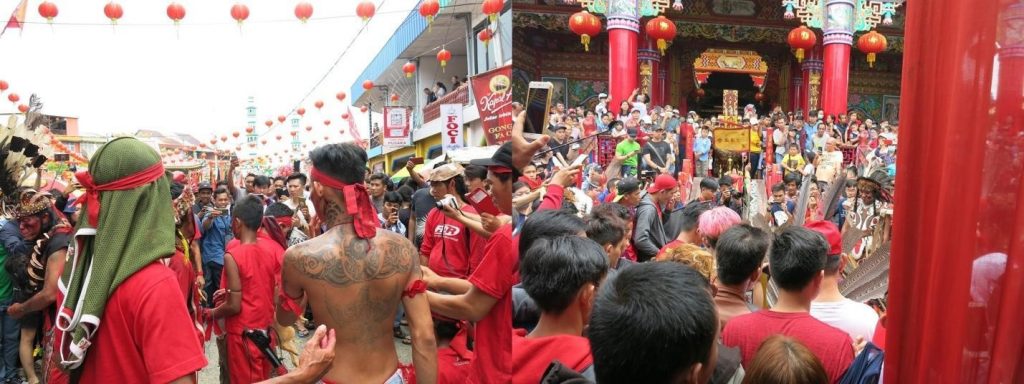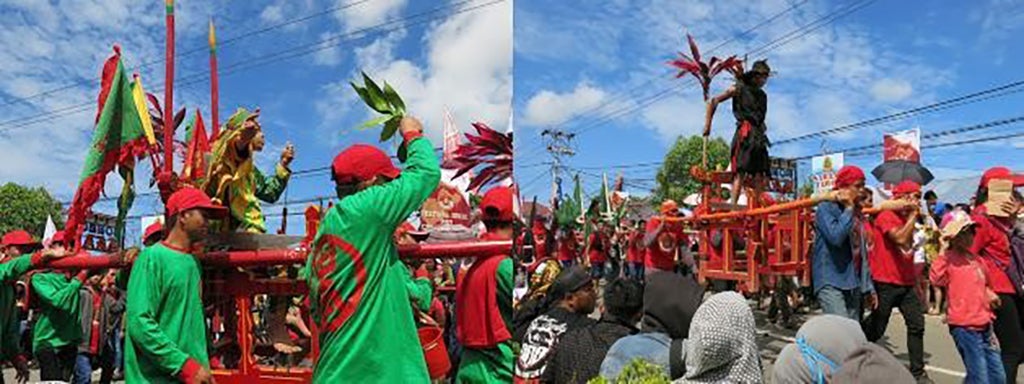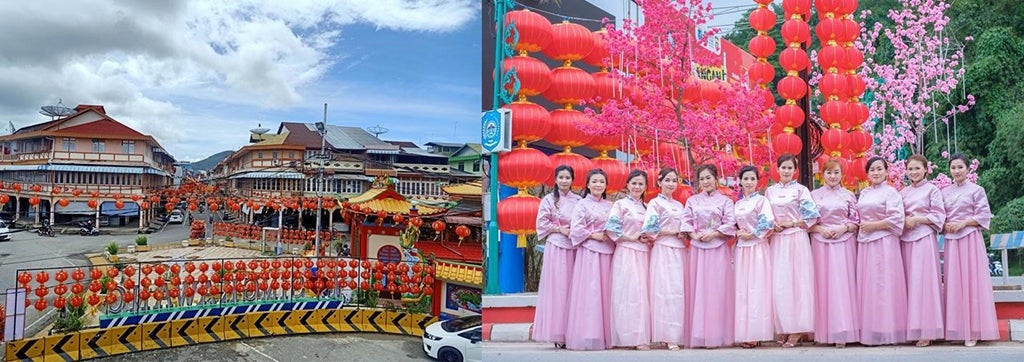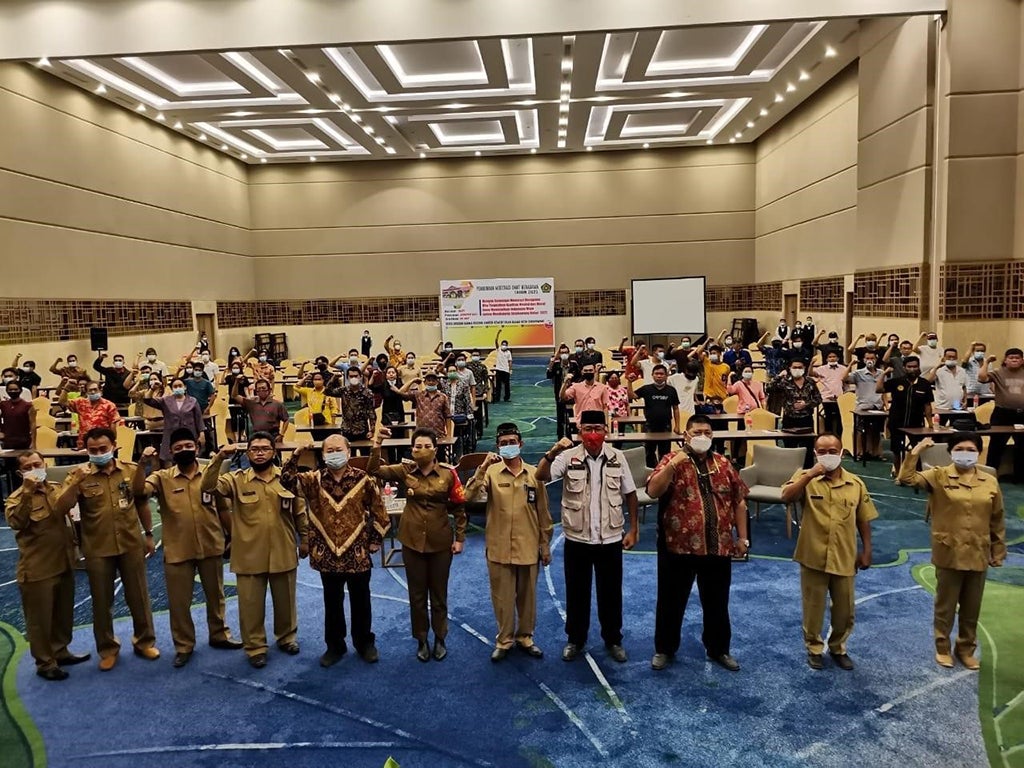Is it Culture or Religion? Prohibiting Cap Go Meh while Maintaining Freedom of Religion (1)
contributed by Emily Hertzman, 5 March 2021
As COVID-19 cases continue to rise in Indonesia, more and more regulations are being put into place, including regionally. Singkawang, West Kalimantan, is classified as an Orange Zone: meaning that there is a small cluster outbreak which could potentially lead to a large cluster outbreak. As a result, the governor of the province issued a Circular (Indo. Surat Edaran) on January 8th, 2021. This Circular addressed the celebration of Cap Go Meh during the COVID-19 pandemic.
Cap Go Meh—the 15th day of the 1st lunar month—is the occasion of an enormous spirit-medium (Hakka. tatung) ritual in Singkawang. This event involves hundreds of mediums and thousands of assistants, as well as spectators and out of town tourists. It is a three-day event, extremely busy (Indo. ramai) and involves ritual activities at multiple temples. The possessed tatung perform exorcist rituals that chase away bad spirits and cleanse the streets of the city for the coming year. This ritual has a long local history and now increasingly involves participation from members of all local ethnic groups, while remaining primarily a Chinese religious ritual.

Figure. 1. Crowds during Cap Go Meh, Singkawang 2018
The Circular states that "every person, community group, business actor, manager, organizer or individual responsible for public places and facilities is prohibited from carrying out Cap Go Meh celebration activities in 2021, such as dragon or spirit-medium parades and the like which invite a crowd, with the exception of religious rituals.” The exception clause has caused some confusion and has led different parties to diverge in their interpretations of what constitutes culture, tourism and religious ritual.
On 22 January 2021, the city government held a meeting to explicitly discuss whether the Cap Go Meh celebration is best defined as a cultural tradition or a religious ritual. The Singkawang branch of the Indonesian Confucian Council (MAKIN- Majelis Agama Konghucu Indonesia) was of the opinion that it was a local cultural tradition whereas the Three Teachings Family (KBUT- Keluarga Besar Umat Tridharma) insisted that it was a religious ritual. The stakes of this definition are clear: if it is a religious ritual, it can be carried out in a limited way following COVID-19 health protocols; if it is merely a cultural tradition, it is prohibited.
The attempt to disentangle and differentiate the “traditional/cultural” from the “religious/ritual” may appear impossible and artificial, neither a reflection of the multi-faceted nature of the event, nor constitutive of emic categories in which people understand their actions. However, these distinctions are relevant in the Indonesian context and this polemic reflects the need to uphold freedom of religious practice enshrined in the constitution.
The debate about the definition of Cap Go Meh made the city government convene another meeting to discuss this topic at length. This meeting, held on January 26, 2021, was attended by the mayor, Tjhia Chui Mei, representatives from the legislative council, the military, the police, religious leaders, community leaders, tatung, heads of temple committees, and members of previous years’ Cap Go Meh organizing committees. The result of the meeting was a decision to allow the ritual aspects of Cap Go Meh to take place with a few major changes:
- Each tatung group can only include 2 people, namely the tatung and one assistant.
- Tatung is not allowed to use props such as the palanquin or play any musical instruments.
- Tatung may not perform any ‘attractions’ or do anything that could attract a crowd.
- Temporary three-level altars (Hakka. Sam Thoi) are permissible only at places of worship.
This will be a major change from how Cap Go Meh has been held over the past 15 years, in which tatung are carried through the streets on palanquins by 6-10 bearers followed by groups of musicians and others who carry banners and holy water, producing a boisterous procession.

Figure. 2. Tatung carried on palanquins during Cap Go Meh, Singkawang 2018
In light of this, no new Cap Go Meh organizing committee will be convened this year, and several highly-experienced board members have resigned, including the Chief Executive Tjhai Leonardi and General Secretary Bong Cin Nen. The task of the committee this year, composed of the remaining volunteers, is simply to arrange for city decorations - they will not organize and administer the tatung parade like usual. All other routine annual activities such as cultural festivals, lantern parades, home decoration competitions and other competitions have all been canceled.

Figure. 3. Decorations for Chinese New Year, Singkawang, West Kalimantan, 2021

Figure. 4. Fostering Moderation of Religious Communities Meeting, Singkawang, Feb 2, 2021
On February 2, 2021, an internal Buddhist assembly consisting of the Indonesian Taoist Council (MTI- Mejelis Tao Indonesia) Singkawang branch and the Indonesian Buddhist Council of the Three Teachings (MAGABUTRI- Majelis Agama Buddha Tridharma) of West Kalimantan held a discussion during a meeting hosted by the Buddhist Department of the Ministry of Religion in Singkawang. MTI and MAGABUTRI maintain the view that Cap Go Meh is a religious ritual, and must be carried out despite the pandemic but with health protocol in place. Echoing the previous meeting they suggested that each group consist of a maximum of 3 people: a spirit-medium, an assistant and a driver.
While the Circular from the governor stated that it is not permissible to organize activities that can invite crowds, this was not discussed at the meeting because it was felt that the government party responsible for implementing or policing this restriction was unclear. Instead the meeting was used as an information session to answer questions for tatung who are perplexed by the situation.
In addition to health factors related to the spread of the COVID-19 virus, the condition of Indonesia's national politics greatly influences the steps and policies that are taken into consideration before decisions are made. Currently, Indonesia is fighting a small but vocal radicalism movement led by the Islamic Defenders Front (FPI- Front Pembela Islam), and the FPI leader has been arrested as a suspect in a case of creating a crowd (Indonesian. mengundang kerumunan). In its movement, FPI frequently uses ‘Chinese issues’ to create negative sentiments with a goal of reviving discriminatory New Order propaganda against Chinese citizens.
Cap Go Meh, as both a Chinese event and an event which attracts huge crowds, is at risk of being caught up in this kind of politics, in which prohibitions made in the name of public health and safety also correspond to the pressures from radical peoples’ organizations, such as FPI, who seek to restrict Chinese cultural spectacles in Indonesia in their pursuit of an exclusivist vision of an Islamic society.
Not only is Cap Go Meh the biggest annual event in Indonesia, Singkawang is also the main tourist destination in this area. Even without any events, Singkawang is always full of local tourists between cities every weekend - which makes it even harder for local authorities to anticipate or control the massive crowds which congregate at this hub.

Figure. 5. Local tourist in Singkawang, January 2021
The government and religious councils involved in organizing Cap Go Meh already understand the sensitivities of holding this event, which often stem from the politics of publically financing this polytheistic and exorcist Chinese Religious ritual in a non-Chinese and Muslim majority country. But the pandemic has added a new level of complexity.
It is a dilemma because as a religious ritual, there is an imperative to carry it out from a) a ritual perspective, because it is significant to the ritual specialists and their followers who see this annual event as purification and protection from potential dangers and calamities, and b) from the perspective of religious freedom. However, from a public health perspective, the crowds that will form could be a dangerous site of virus transmission in a city already experiencing a cluster of cases.
It is also sensitive because, if Cap Go Meh becomes crowded, the Chinese community could be blamed for not being able to control people and fuelling the viral transmission, which might feed inter-ethnic politics haunted by Suharto era discriminations and inequalities. Because of the prohibition, the holding of Cap Go Meh is now also a legal matter which could involve police intervention, and possible imprisonment if tatung initiates and engages in “attractions” that would invite a crowd.
Finally, there are economic considerations. Every year Cap Go Meh contributes substantially to the local economy, in the form of travel, food, hospitality services, and related supply chain services. There is also a system of fundraising and financial distribution in which money is donated by wealthy locals and Jakarta-based Singkawang business people are used to pay for tatung, their assistants and the work of the Cap Go Meh organizing committee members who are of lesser means.
Singkawang is already experiencing a major economic depression due to the pandemic, and it is now facing the loss of its primary annual period of economic stimulus. The provincial Circular explicitly names business actors in the list of those prohibited from participating in Cap Go Meh, possibly in recognition of their ongoing role in sponsoring these activities, which are seen as meaningful ways to contribute socially, and invest in cultural preservation in one’s hometown (indo. Kampung Halaman).
On February 6, 2021, the mayor and organizing committee held another information session about the rules for holding the Cap Go Meh ritual this year according to the details in the Circular. At this meeting, the mayor, Thjia Chui Mei ceremonially handed over prayer packages to several places of worship as a symbol of continued support. These temples were:
- Sui Tet Sen Kiun, Kulor (Man. 福 律 水 德 宫 / 水 德 星君)
- Tridharma Bumi Raya Temple (Man. 三条 港 大 伯公)
- Kon Ti Kiung Temple, Kaliasin Luar (Man. 鹽 町 關 帝 宮)
- Tridharma Bumi Raya Temple, Sinnam (Man. 新 喃 大 伯公廟)
- Tung Shin Kiung / Thai Shin Ja Temple (Man. 东 圣宫 / 大 圣爷)
- Sam Chin Miau / Fab Zhu Kung Temple (Man. 三 清庙 / 法 主公)
A decision was also made to distribute the same prayer packages to all places of worship and tatung participants from the previous year, according to zones:
- West Singkawang, 305 packages,
- Central Singkawang, 125 packages,
- East Singkawang, 136 packages,
- South Singkawang, 274 packages,
- North Singkawang, 34 packages.
Members from last year’s organizing committee are, at the time of writing, distributing these packages, which total 874 and have been assembled by donations from last year’s Cap Go Meh organizing committee. The package consists of large incense sticks (Man. 大 香), small incense sticks (Man. 小 香), large candles (Man.大 蜡烛), small candles (Man. 小 蜡烛), Kim Fa Fung Chiu, Kim Kho (Man. 金 紙), Nyiun Kho (Man. 銀 紙), Shin Thin, Pak Kung Ji and Kui Nyin Phu (Man. 贵人 符).

Figure. 6. Prayer packages in lieu of sponsoring Cap Go Meh, Singkawang, 2021
In addition, on February 11, 2021, the Three Teachings Council distributed 160 boxes of face masks to 32 Chinese temples, so that on the eve of Chinese New Year locals could pray in accordance with health protocol. On that night, almost all of the main places of worship were either escorted by members of the police, the Three Teachings Council, the Buddhist Working Group, or the Ministry of Religion.
The prayer rituals ran smoothly because there were enough masks, hand washing facilities, hand sanitizers, and hand-held thermometers. Escort teams controlled people’s distancing by making a queuing system. Some places of worship put up barricades to separate the inflow and outflow of worshippers, including managing the direction of incense burning inside the temple based on Chin Liung Phak Fu (Man. 清 龙 白虎), i.e. moving from the right (the position of the dragon) to the left (the position of the tiger).
While the temples were orderly, crowds of people gathered outside the areas of worship as the local cafes were filled with residents and tourists from surrounding cities who came out to enjoy the atmosphere of Chinese New Year in Singkawang, particularly because the city had been given an elaborate make-over of decorations. As a result, at 11.00 pm the police forced all the cafes surrounding the central temple, Tridharma Bumi Raya, to close.
The mood in Singkawang currently is characterized by confusion, and a general sadness about the fate of Cap Go Meh 2021. Some tatung are content to abide by the temporary rules, while others oppose them and are vocal on social media, heightening the general anxiety about what might happen. In light of this, the police are also anticipating having to step in to intervene in crowding.

Figure. 7. Protest posting on Facebook by vocal spirit-medium
The most significant participants in this ritual, the gods and spirits, are themselves also being consulted through tatung consultations. A representative from MAGABUTRI, specifically has consulted two different mediums and two different gods asking them for their opinions and instructions for how to proceed with the ritual this year. According to the prediction of one prominent deity who has participated in Cap Go Meh for decades, on the day of Cap Go Meh, the Tridharma Bumi Raya temple will face a large crowd and there will be victims who will be charged with violating the COVID-19 health protocols. The problem, he predicts, will not be the tatung, but rather locals and tourists who come to gawk. To avoid this situation, he suggested preparing as many volunteer security personnel as possible to dispel crowds before police are called in. In a rare move, the deity gave the representative from MAGABUTRI a sacred object, the fan that he holds and uses daily, to take home and keep until after Cap Go Meh has passed. This object, he said, will provide both protection and strength in dispersing the crowd.
To find out what occurred on the day of the event, please read the next posting in this series.
Disclaimer: The views and opinions expressed in this article are those of the authors and do not necessarily reflect the position of the blog editorial team or the Asia Research Institute.
South Asia | Southeast Asia | East Asia | Other Places | Hinduism | Buddhism | Islam | Christianity | Other Religions
Emily Hertzman is a sociocultural anthropologist whose research focuses on Chinese Indonesian mobilities and identities. She received a B.A and M.A. from the University of British Columbia and a Ph.D. from the University of Toronto (2017). She will be joining the Asia Research Institute in the Religion and Globalization cluster at the National University of Singapore as a Research Fellow in 2021.

